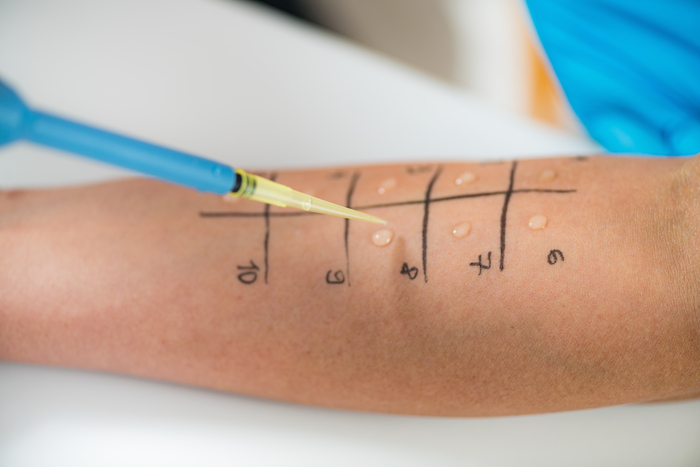
Ensure your health. Get tested today.
Convenient lab testing at your fingertips at more than 5,000 locations nationally. Consult with a doctor, or get tested on your own.

Allergy tests come in several forms, primarily skin tests and blood tests. Skin tests involve applying a small amount of allergen to the skin’s surface through a prick or scratch, allowing healthcare professionals to observe any immediate reactions, such as redness or swelling. The AAAAI explains that this method is quick and typically provides results within minutes.
On the other hand, blood tests measure the immune system's response to specific allergens by detecting the presence of immunoglobulin E (IgE) antibodies. While blood tests can take longer to yield results, they are particularly useful for individuals who may have skin conditions or are unable to undergo skin testing. Overall, both types of tests play a vital role in pinpointing allergens, guiding treatment options, and helping individuals manage their allergies effectively.
Understanding the various types of allergy testing is crucial for effectively diagnosing and managing allergic reactions. Each testing method has its unique approach and is suited for different situations, allowing healthcare providers to tailor their strategies based on individual needs.
Below is an outline of the most common types of allergy tests, and a brief explanation of each to help you grasp their purposes and applications.
Skin Prick Scratch Test: This test involves placing small amounts of allergens on the skin and pricking or scratching the surface to allow exposure. It provides quick results, typically within 15-20 minutes, indicating immediate allergic reactions.
Intradermal Skin Test: In this method, a small amount of allergen is injected just beneath the skin's surface. It is often used when skin prick tests yield negative results but an allergy is still suspected, as it can detect more allergens.
Patch Test: This test is used primarily for diagnosing contact allergies. Allergens are applied to patches that are placed on the skin for 48 hours, after which any reactions are assessed. This method helps identify delayed allergic responses.
Oral Challenge Test: Conducted under medical supervision, this test involves consuming small amounts of a suspected allergen to observe for any reactions. It is often used for food allergies and helps confirm or rule out specific sensitivities.
Radioallergosorbent Test (RAST): This blood test measures the level of IgE antibodies specific to certain allergens. It is useful when skin testing is not viable and can help identify a range of allergies.
Enzyme-Linked Immunosorbent Assay (ELISA, or EIA): Similar to RAST, this blood test detects specific IgE antibodies to various allergens. It is often used for food allergies and provides a quantitative measure of the immune response.
These testing methods each have their strengths and limitations, and the choice of which test to use typically depends on the individual's medical history, symptoms, and the suspected allergens.
Allergy blood tests are an important diagnostic tool that can provide valuable information about an individual's allergic sensitivities, according to the AAAAI. One of the primary reasons for conducting allergy blood tests is when skin testing is not feasible. This may be due to existing skin conditions, such as eczema, which could interfere with accurate skin test results, or when patients are on medications that can affect skin testing, such as antihistamines.
Additionally, blood tests are beneficial for individuals with a history of severe allergic reactions, as they can be conducted safely without the risk of provoking an immediate allergic response. Blood tests also offer a quantitative measure of specific IgE antibodies, helping to assess the severity of an allergy and tailor treatment plans accordingly. Ultimately, allergy blood tests serve as a crucial alternative for diagnosing allergies, ensuring that individuals receive the appropriate care and management for their specific sensitivities.
Recognizing the signs that indicate a potential allergy can be the first step toward effective management and treatment. If you experience any of the following signs, it may be beneficial to consult a healthcare professional for further evaluation and testing:
Experiencing Hives: Raised, itchy welts on the skin can indicate an allergic reaction to food, medication, or environmental allergens.
Suffering from Dermatitis: Persistent skin inflammation or rash, particularly if it occurs after contact with certain substances, may suggest an allergic response.
Dealing with Eczema: This chronic skin condition often has an allergic component and can worsen with exposure to allergens.
Having Red, Itchy Eyes: Allergic conjunctivitis can cause discomfort and is often triggered by pollen, pet dander, or dust mites.
Persistent Coughing, Nasal Congestion, or Sneezing: These symptoms, especially when seasonal or triggered by exposure to certain environments, may indicate allergies.
Symptoms of Asthma: Wheezing, shortness of breath, or chest tightness can be exacerbated by allergens, necessitating further investigation.
Itching and Tingling Sensations in the Mouth: These sensations, especially after eating certain foods, can signal oral allergy syndrome.
Feeling Throat Tightness: A sensation of constriction in the throat may indicate an allergic reaction, particularly to food or insect stings.
Difficulty Breathing: This is a serious symptom that can arise from severe allergic reactions, requiring immediate medical attention.
Abdominal Pain, Vomiting, or Diarrhea: Gastrointestinal symptoms following food intake can suggest food allergies and warrant testing for confirmation.
If you notice any of these signs, the AAAAI notes that seeking professional advice for allergy testing can help identify triggers and lead to appropriate treatment strategies.
For skin tests, such as the skin prick scratch test, results can often be obtained within 15 to 30 minutes after the test is administered, according to the AAAAI. This quick turnaround allows healthcare providers to assess immediate allergic reactions efficiently. In contrast, other tests, like patch tests, require a longer commitment, as the patches are usually left on the skin for 48 hours before being evaluated for reactions. Blood tests, such as the Radioallergosorbent Test (RAST) or Enzyme-Linked Immunosorbent Assay (ELISA), typically involve a blood draw that takes only a few minutes, but results may take several days to process and analyze in a laboratory. Overall, while some tests provide immediate feedback, others necessitate a longer wait, so it’s important to discuss the specifics with your healthcare provider to understand what to expect.
Allergy blood tests offer a unique approach to diagnosing allergic reactions, and understanding their advantages and disadvantages is crucial for making informed decisions about allergy management. Below are the pros and cons of blood allergy tests — providing insights into when they may be the preferred option and when other testing methods might be more suitable.
Can Be Done Anytime, Regardless of Medications: Allergy blood tests do not require patients to stop taking antihistamines or other medications, making them convenient for individuals who are currently managing their symptoms with medication.
Requires Only One Needle Stick: Unlike some skin tests that may require multiple pricks, blood tests typically involve just one blood draw, minimizing discomfort and anxiety for patients.
Ideal for Those Afraid of Needles: For individuals who may be particularly sensitive to the idea of skin testing or have a fear of needles, blood tests can be a more comfortable alternative since they involve a single procedure.
Preferred for Infants and Very Young Children: Blood tests can be more suitable for young children who may not tolerate skin tests well, providing a safer option for assessing allergies without the risk of immediate reactions.
Results Take Days or Weeks: Unlike skin tests that provide immediate feedback, blood tests often require several days or even weeks for results to be processed and returned, delaying diagnosis and treatment.
Requires Lab Evaluation for Results: Blood samples must be sent to a laboratory for analysis, which adds an additional step to the testing process and can contribute to longer wait times for results.
More Expensive Than Skin Testing: Blood tests tend to be more costly than skin tests, which can be a consideration for patients and healthcare providers when determining the best testing method.
Often Not Covered by Insurance: Many insurance plans may not cover the cost of allergy blood tests, leading to potential out-of-pocket expenses for patients seeking this form of testing.
Less Sensitive Than Skin Tests: In some cases, blood tests may not be as sensitive as skin tests, potentially resulting in false negatives and requiring further testing for accurate diagnosis.
By weighing these pros and cons, individuals can better understand the role of blood allergy tests in their allergy assessment journey and make informed choices based on their specific needs.
Allergy blood tests typically measure the level of immunoglobulin E (IgE) antibodies specific to various allergens, according to the NIH. A higher level of IgE in response to a particular allergen suggests a greater likelihood of an allergic reaction when exposed to that substance. The results are often reported as a numerical value, with higher numbers indicating a stronger allergic response. However, it’s important to note that a positive result does not always guarantee that you will experience symptoms; some individuals may have elevated IgE levels without significant allergic reactions. Your healthcare provider will interpret these results in conjunction with your medical history, symptoms, and any other relevant tests to develop a comprehensive understanding of your allergies. Based on this information, they can recommend appropriate management strategies, which may include avoidance of specific allergens, medication, or further testing if necessary.
Allergy testing helps identify the specific triggers causing allergic reactions, allowing for better management of environment, lifestyle, and treatment strategies.
There are several types of allergy tests, including skin tests (like skin prick scratch test, intradermal skin test, and patch test), oral challenge test, and blood tests (like RAST and ELISA).
Blood tests are recommended when skin testing is not feasible due to skin conditions or medications, or for individuals with a history of severe allergic reactions.
The time to get results varies. Skin tests can provide results within minutes, while blood tests may take several days to process and analyze in a laboratory.
Allergy blood tests measure the level of IgE antibodies specific to various allergens. A higher level of IgE suggests a greater likelihood of an allergic reaction to that substance.
Management strategies can include avoidance of specific allergens, medication, or further testing if necessary.
Recognizing signs of potential allergies can be the first step. If you experience symptoms like sneezing, itching, or difficulty breathing after exposure to certain substances, it might be worth seeking professional advice for allergy testing.
By identifying specific allergens that trigger reactions, individuals can make informed decisions about their environment and lifestyle, which can lead to a reduction in symptoms and an overall improvement in quality of life.

Convenient lab testing at your fingertips at more than 5,000 locations nationally. Consult with a doctor, or get tested on your own.